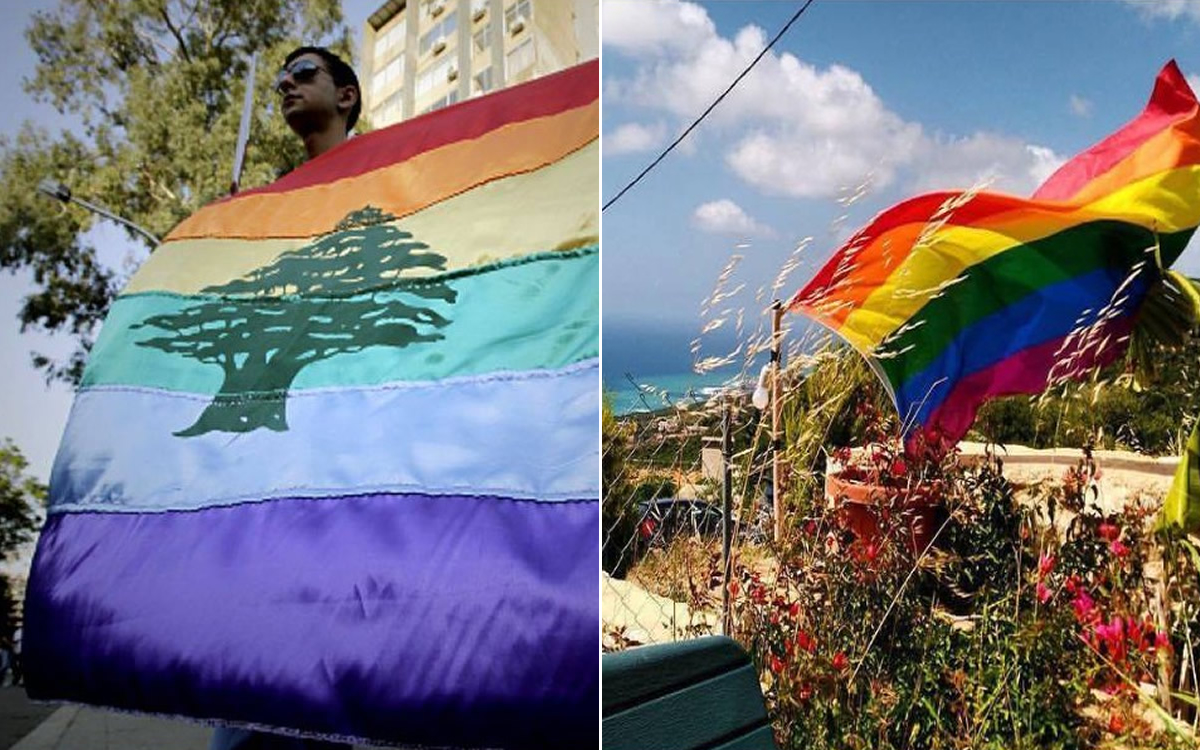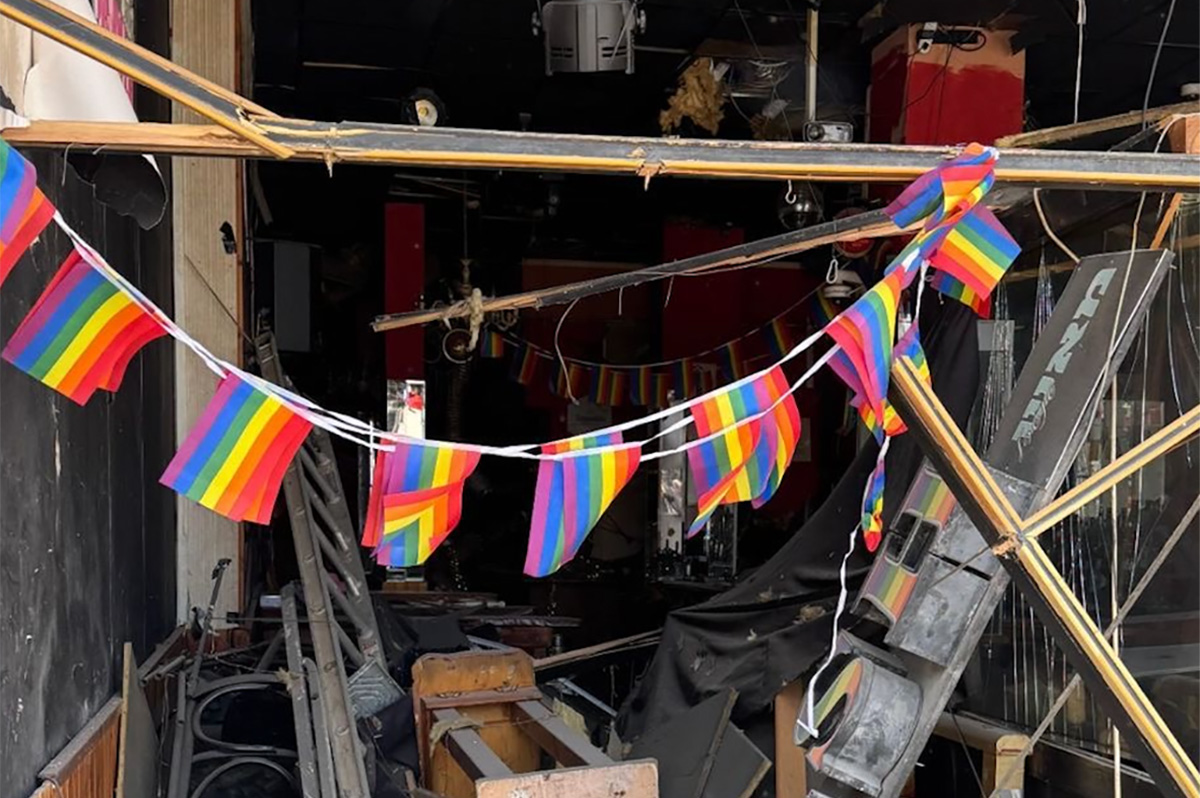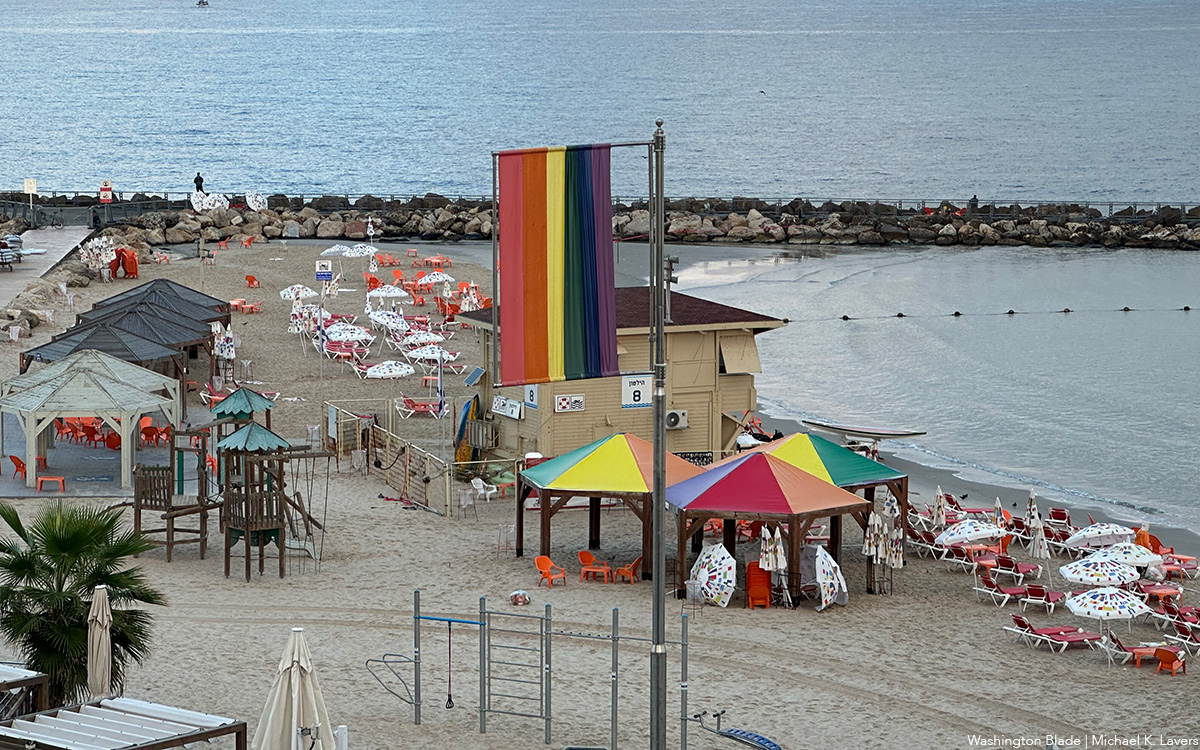Middle East
LGBTQ-friendly bar attacked in Lebanese capital
Attacks against country’s LGBTQ and intersex community are increasing

Members of a Christian militant group Jnoud El-Rab, the so-called Soldiers of God, attacked patrons outside of a popular LGBTQ-friendly club and bar in the Lebanese capital of Beirut’s restaurant and entertainment neighborhood, Mar Mikhael, on Aug. 23.
A drag event was being held at the Om Bar Room, when the men from the anti-LGBTQ Jnoud El-Rab attacked. Multiple videos showed the men physically attacking patrons while yelling that LGBTQ people are “satanic” and have no place in Lebanon.
In the videos the men carrying out the attack can be heard shouting “We warned you, this is only the beginning,” and, “We will not allow the promotion of homosexuality in the land of God.”
he attack lasted more than an hour, with several people injured by militia members, according to Tarek Zeidan, the executive director of Helem, a Lebanese LGBTQ rights group.
“We had to assess whether it was safe to host the event, but we decided to go ahead because drag is a form of entertainment that is mainstream in Lebanon and had not yet been targeted,” one of the event organizers said.
Rasha Younes, a senior researcher for Human Rights Watch’s Lesbian, Gay, Bisexual and Transgender Rights Program reported:
“We stopped the show and had to hide behind the bar, lying down on the floor, breathless,” one of the performers told me. “The police stood on the side, watching, as the men were beating people.”
“There were a dozen men on motorcycles who attacked us. At least two of them had guns,” another performer said.
William Christou, reporting for The New Arab, noted that the first appearance of the Soldiers of God, or Junoud al-Rub, in Arabic, was as a neighborhood watch group in Beirut’s Achrafieh neighborhood more than a year ago.
The group claimed to conduct patrols to ensure security in the area, especially in the wake of Lebanon’s 2019 economic meltdown.
The patrols were reminiscent of the practice of militias self-organizing during Lebanon’s civil war, where the country’s sectarian divisions were enforced by armed groups.
Soldiers of God quickly began employing violence against those who it said threatened Lebanese traditional values.
In June 2022, the group defaced a billboard in Achrafieh, which was decorated with flowers and an LGBTQ rainbow flag. Members then accused the LGBTQ community of promoting “satanism” and of kidnapping children.
The Christian extremist group numbers only around 150, but is infamous for its propensity for violence, the New Arab reported.
The owner of the bar told Amnesty International that when the Internal Security Forces (ISF) arrived at the scene, they prevented the aggressors from entering the bar and aided some guests in their attempts to leave the bar, but they did not stop the attack or arrest any of the assailants.
In recent weeks, Lebanon’s political and religious leaders have intensified their campaign against the LGBTQ community, with the head of a prominent political party calling for LGBTQ people to be killed, the culture minister attempting to ban the movie “Barbie” on grounds that it ‘contradicted morals and values’ and requesting that the media use the term “sexual perversion” to describe homosexuality, and the education minister banning a board game in schools because it depicted a rainbow.
“Last night’s attack on Madame Om, a bar considered to be a safe space for the LGBTI community, marked an alarming escalation in the attacks against LGBTI people that have followed troubling remarks by high-level politicians and religious figures. The authorities must ensure that the attackers are held accountable and demonstrate that such acts have no place in a country invested in upholding human rights,” said Aya Majzoub, Amnesty International’s deputy regional director for the Middle East and North Africa.
“Lebanon’s constitution guarantees equality, free expression, and free assembly for everyone — and these rights must be respected. What happened at Madame Om last night offered an ominous sign of how the situation of the LGBTI people is deteriorating in the country,” Majzoub said.
“The Lebanese authorities must immediately stop creating an environment conducive for discrimination and violence against the LGBTI community to be perpetuated. Crucially, the government should ensure that everyone is protected from violence, regardless of their gender identity or sexual orientation,” Majzoub added.
Israel
Activist recalls experience in Tel Aviv after Israel-Iran war began
Marty Rouse was part of Jewish Federations of North America Pride mission

A long-time activist who was in Israel last month when its war with Iran began has returned to D.C.
Marty Rouse traveled to Israel on June 6 with the Jewish Federations of North America. The 5-day mission ended the night before the annual Tel Aviv Pride parade was scheduled to take place.
Mission participants met with Israeli President Isaac Herzog and several LGBTQ activists in Tel Aviv and Jerusalem. They visited the Western Wall, the Nova Music Festival site, and Nir Oz, a kibbutz in southern Israel that is less than a mile from the country’s border with the Gaza Strip. Mission participants also visited Sderot, a city that is roughly a mile from the Hamas-controlled enclave, a veterans rehabilitation facility, a new LGBTQ health center and the Aguda: The Association for LGBTQ Equality in Israel in Tel Aviv.
Hamas militants on Oct. 7, 2023, killed upwards of 360 partygoers and kidnapped dozens more at the music festival that was taking place at a campground near Re’im, a kibbutz that is roughly 10 miles southwest of Nir Oz. The militants killed or took hostage nearly a quarter of Nir Oz’s residents. They also took control of Sderot’s police station.

Tel Aviv Deputy Mayor Chen Arieli spoke at the mission’s closing party that took place at the Sheraton Grand, a hotel that overlooks Tel Aviv’s beachfront, on June 12.
Rouse and other mission participants planned to stay in Tel Aviv for the Pride parade, which was scheduled to take place the following day. He and Gordie Nathan, another mission participant who lives in Palm Springs, Calif., had checked into a nearby hotel that was less expensive.
“We said our farewells,” recalled Rouse when he spoke with the Washington Blade in D.C. on June 24. “We went to our hotels, and we get the warning, and then all hell broke loose.”
Israel early on June 13 launched airstrikes against Iran that targeted the country’s nuclear and military facilities.
Rouse said mission organizers told him and other participants who remained in Tel Aviv to meet at the Sheraton Grand for breakfast and dinner — Israel’s airspace was closed in anticipation of an Iranian counterattack, and authorities cancelled the Pride parade.
He said he went to bomb shelters at least twice a night for three nights.
Israel’s Home Front Command during the war typically issued warnings about 10 minutes ahead of an anticipated Iranian missile attack. Sirens then sounded 90 seconds before an expected strike.
Rouse and Nathan walked to the Sheraton Grand on June 13 when the Home Front Command issued a 10-minute warning. They reached the hotel in a couple of minutes, and staff directed them to the bomb shelter.
“You know to walk slowly, everything’s fine,” recalled Rouse. “You get 10 minutes, so everything was fine when the alarm goes off.”
Rouse described the Sheraton Grand shelter as “well lit” with WiFi, a television, and air conditioning. He was watching an Israeli television station’s live coverage of the Iranian missile attack when he saw one hit an apartment building in the Tel Aviv suburb of Ramat Gan.
A 74-year-old woman died and her boyfriend was seriously injured.
“I go over to look at the TV, just to watch,” recalled Rouse. “All of a sudden, you watch, and you see one bomb go and land and explode in Tel Aviv on TV. It landed and blew up.”
“I was like, okay, this is real, and so that was scary,” he added.
Rouse said the bomb shelter in the hotel where he and Nathan were staying after the mission ended was far less comfortable.
“It was dark. It was humid. It was hot. It was very uncomfortable,” said Rouse. “You really felt alone.”

Rouse and nearly everyone else on the mission who were in Tel Aviv when the war began left Israel on June 15. They boarded buses that took them to the Jordanian capital of Amman, which is a roughly 2 1/2-hour drive from Tel Aviv through the West Bank.
Rouse described the trip as “like a field trip” until they drove across the Jordan River and arrived at the Jordanian border crossing.
“You walk into this room, and instead of being in a well air-conditioned airport, you’re in this hot, humid, small place in the middle of the desert, packed with people, and those big, large, loud fans and pictures of military people on the walls,” he said. “It was almost like a Casablanca kind of feeling.”
Rouse said Jordanian authorities brought mission participants through customs in groups of 10. A Jewish Federations of North America liaison from Amman who previously worked as a tour guide for A Wider Bridge — a group that “advocates for justice, counters LGBTQphobia, and fights antisemitism and other forms of hatred” — went “behind closed doors” to ensure everyone was able to enter the country.
“It took a really long time,” Rouse told the Blade.

Mission participants arrived in Amman a short time later. They checked into their hotel and then had dinner at a restaurant.
“Now we feel like we’re safe and we’re in Amman,” recalled Rouse. “We’re sitting outside having a beautiful dinner.”
Iranian missiles passed over Amman shortly after Rouse and the other mission participants had begun to eat their dessert. They went inside the restaurant, and waited a few minutes before they boarded busses that brought them back to their hotel.
“No one was openly freaking out, which I was surprised by,” said Rouse.
The group was scheduled to fly from Amman to Cairo at 11 p.m. local time (4 p.m. ET) on June 16. They visited Jerash, an ancient city north of Amman, before their flight left Jordan.
“[The Jerash trip] actually took our minds off of everything,” said Rouse.
A Jewish Federations of North America contact met Rouse and the other mission participants at Cairo’s airport once their flight landed. Rouse arrived at JFK Airport in New York on June 17.
Trump-announced ceasefire ended 12-day war
President Donald Trump on June 23 announced a ceasefire that ended the 12-day war.
The U.S. three days earlier launched airstrikes that struck three Iranian nuclear sites. The ceasefire took effect hours after Iran launched missiles at a U.S. military base in Qatar.
Iran said the war killed more than 900 people in the country.
The Associated Press notes Iranian missiles killed 28 people in Israel. One of them destroyed Tel Aviv’s last gay bar on June 16.
The war took place less than two years after Oct. 7.
The Israeli government says Hamas militants on Oct. 7, 2023, killed roughly 1,200 people on that day when it launched its surprise attack on the country. The militants also kidnapped more than 200 people.
The Hamas-controlled Gaza Health Ministry says Israeli forces have killed nearly 55,000 people in the enclave since Oct. 7. Karim Khan, the International Criminal Court’s chief prosecutor, has said Israeli Prime Minister Benjamin Netanyahu and former Hamas leader Yahya Sinwar, who the IDF killed last October, are among those who have committed war crimes and crimes against humanity in Gaza and Israel.

Rouse upon his return to the U.S. said he “was never as aware of the comfort of another human being than I was during that time.” Rouse affectionately called Nathan his “bomb shelter boyfriend” and even questioned the way he reacted to the missile alerts.
“He’s sitting on the edge of the bed and he goes, okay, I’m going to put on my socks and my shoes, and I say, really? You’re going to put on your socks,” Rouse told the Blade. “The fact that I was nervous, that putting on socks might have changed the direction of our lives, to me was like I can’t believe I said that to him.”
Rouse quickly added Nathan helped him remain calm.
“If I was by myself, those nights would have been long enough,” said Rouse. “It’s a totally different feeling to be with another human that you know than to be by yourself.”

Rouse also praised the Jewish Federations of North America.
“JFNA really sprung into action and started to figure out all options to get us all safely home,” said Rouse. “It was all about logistics. Staff worked around the clock identifying and then mobilizing to get us back to the states. It was a great team effort and I know I speak for everyone in expressing our deep appreciation for their dedication to getting us safely home.”
Israel
Iranian missile destroys Tel Aviv’s last gay bar
Mash Central is a few blocks from US Embassy

An Iranian missile on June 16 destroyed a gay bar in Tel Aviv, Israel.
The missile struck Mash Central, which is a few blocks from the U.S. Embassy on Allenby Street, and surrounding buildings. Israeli sources confirmed to the Washington Blade that Mash Central was the only gay-specific bar in Tel Aviv.
“Iran’s missile strike yesterday destroyed Tel Aviv’s only dedicated gay bar,” reads one Instagram post with pictures from inside the bar. “This place provided a safe space for minorities to express themselves — now it’s trashed.”
Mash Central describes itself as Tel Aviv’s “last gay bar standing,” even though the city promotes itself as one of the world’s most LGBTQ-friendly cities.
Israel on June 13 launched airstrikes against Iran that targeted the country’s nuclear and military facilities. Iran since the war began has launched hundreds of missiles towards Israel.
Tel Aviv’s Pride parade was scheduled to take place on June 13, but authorities cancelled it. Caitlyn Jenner, who was to have been the event’s guest of honor, is among those who were stranded in Israel after the war began.
Israel
Tel Aviv Pride parade cancelled after Israel attacks Iran
Caitlyn Jenner was to have been guest of honor

Tel Aviv authorities on Friday cancelled the city’s Pride parade after Israel launched airstrikes against Iran.
The Associated Press notes the Israeli airstrikes targeted nuclear and military facilities in Iran. Reports indicate the airstrikes killed two top nuclear scientists and the leader of Iran’s Revolutionary Guard.
Iran in response to the airstrikes launched more than 100 drones towards Israel. The Israel Defense Forces said it intercepted them.
The Tel Aviv Pride parade had been scheduled to take place on Friday. Caitlyn Jenner was to have been the event’s guest of honor.
Authorities, in consultation with local LGBTQ activists, last year cancelled the Tel Aviv Pride parade out of respect for the hostages who remained in the Gaza Strip after Oct. 7. Jerusalem’s annual Pride parade took place on June 5.
-

 U.S. Supreme Court5 days ago
U.S. Supreme Court5 days agoSupreme Court to consider bans on trans athletes in school sports
-

 Out & About5 days ago
Out & About5 days agoCelebrate the Fourth of July the gay way!
-

 Virginia5 days ago
Virginia5 days agoVa. court allows conversion therapy despite law banning it
-

 Obituary5 days ago
Obituary5 days agoLongtime DC resident Thomas Walsh dies at 87











